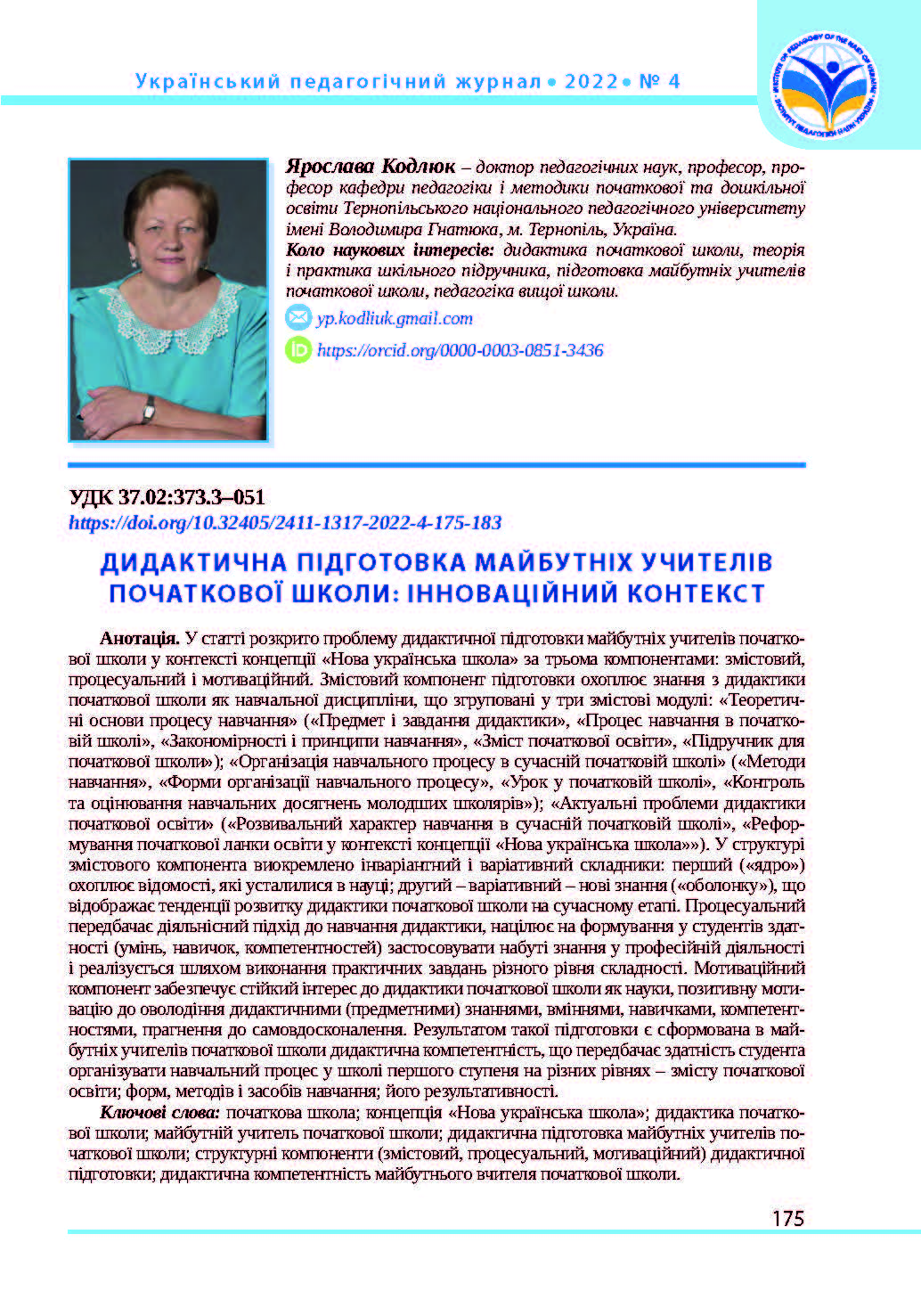Abstract
The article deals with the problem of didactic training of future primary school teachers in the context of the New Ukrainian School concept in terms of three components: content, procedural and motivational. The content component of training includes knowledge of primary school didactics as an educational discipline, grouped into three content modules: «Theoretical foundations of training process» («The subject and tasks of didactics», «Training process in primary school», «Regularities and principles of training», «Content of primary education», «Textbook for primary school»); «Organization of educational process in modern primary school» («Methods of teaching», «Forms of organization of educational process», «Lesson in primary school», «Control and evaluation of educational achievements of younger schoolchildren»); «Actual problems of didactics of primary education» («Developmental nature of training in modern primary school», «Reforming the primary link of education in the context of the concept of the New Ukrainian school). In the structure of the content component invariant and variable components have been distinguished: the first one («core») includes information that has been established in science; the second one – variable – new knowledge («shell»), which reflects trends in the development of primary school didactics at a certain historical stage. The procedural component involves an activity-based approach to teaching didactics, aims at the formation of students’ (abilities, skills, competencies) to apply acquired knowledge in professional activities, and is implemented by performing practical tasks of various levels of difficulty. The motivational component ensures sustained interest in primary school didactics as a science, positive motivation to acquiring didactic (subject) knowledge, abilities, skills, competencies, and the desire for self-improvement. The result of such training is the didactic competence formed in future primary school teachers, which involves student’s ability to organize the educational process in the school of a first degree at different levels – the content of primary education; forms, methods and means of education; its effectiveness.
Keywords: primary school, the concept of the New Ukrainian School, didactics of primary school, future primary school teacher, didactic training of future primary school teachers, structural components (content, procedural, motivational) of didactic training, didactic competence of future primary school teachers.
References
Барбашова, І. А. (2022). Дидактика: навч. посіб. 3-тє вид., оновл. та випр. Мелітополь: Видавничій дім Мелітопольської міської друкарні.
Кодлюк, Я. (2012). Дидактична система О. Я. Савченко. Науковий простір академіка Олександри Савченко / упоряд.: Я. П. Кодлюк, Т. Я. Довга, Л. М. Заліток, О. С. Покусова; за ред. Я. П. Кодлюк. Київ: Богданова А. М., 224–235.
Кодлюк, Я. (2013). Суб’єктність молодшого школяра в навчальній діяльності. Початкова школа. 1. 6–9.
Кодлюк, Я. П. (2013). Дидактика початкової школи: практичний курс: навчально-методичний посібник. Тернопіль: Астон.
Кодлюк, Я. П. (2016). Ключові компетентності у змісті підручників для початкової школи. Проблеми сучасного підручника. 17. 182–191.
Кодлюк, Я. П. & Кобрин, З. А. (2021). Ключова компетентність молодших школярів «навчання впродовж життя»: змістовий аспект. Концептуальні шляхи розвитку наукових знань: мат-ли ІІІ Міжнародної науково-практичної конференції (м. Київ, 6–7 лютого 2021 року). Київ: МЦНіД, 29–30.
Кодлюк, Я. П., Онишків З. М. (2007). Педагогіка початкової школи: програма навчальної дисципліни (за вимогами кредитно-модульної системи). Тернопіль: ТНПУ ім. В. Гнатюка.
Лозенко, А. П. (2010). Рефлексивні уміння як складові змістового компоненту дидактичної підготовки майбутнього вчителя початкових класів: компетентнісний підхід. Науковий часопис НПУ імені М.П. Драгоманова (Серія: Теорія і практика навчання та виховання): зб. наук. праць. Київ: вид-во НПУ імені М. П. Драгоманова. 14. 65–71.
Нова українська школа. (2016). Концептуальні засади реформування середньої освіти. https://mon.gov.ua/storage/app/media/zagalna%20serednya/nova-ukrainska-shkola-compressed.pdf
Савченко, О. (2012). Компетентнісна спрямованість нових навчальних програм для початкової школи. Початкова школа. 8. 1–6.
Савченко, О. Я. (2012). Дидактика початкової освіти: підручник. Київ: Грамота.
Савченко, О. Я. (1997). Дидактика початкової школи: підручник для студентів педагогічних факультетів. Київ: Абрис.
Савченко, О. Я. (1999). Дидактика початкової школи: підручник для студентів педагогічних факультетів. Київ: Генеза.
Савченко, О. Я. (1993). Урок у початкових класах: навчально-методичний посібник. Київ: Освіта.
Ярошинська, О. О. (2012). Дидактика: навчальний посібник. 2-ге вид., переробл. і доп. Умань: ПП Жовтий О. О.

This work is licensed under a Creative Commons Attribution-NonCommercial-ShareAlike 4.0 International License.


